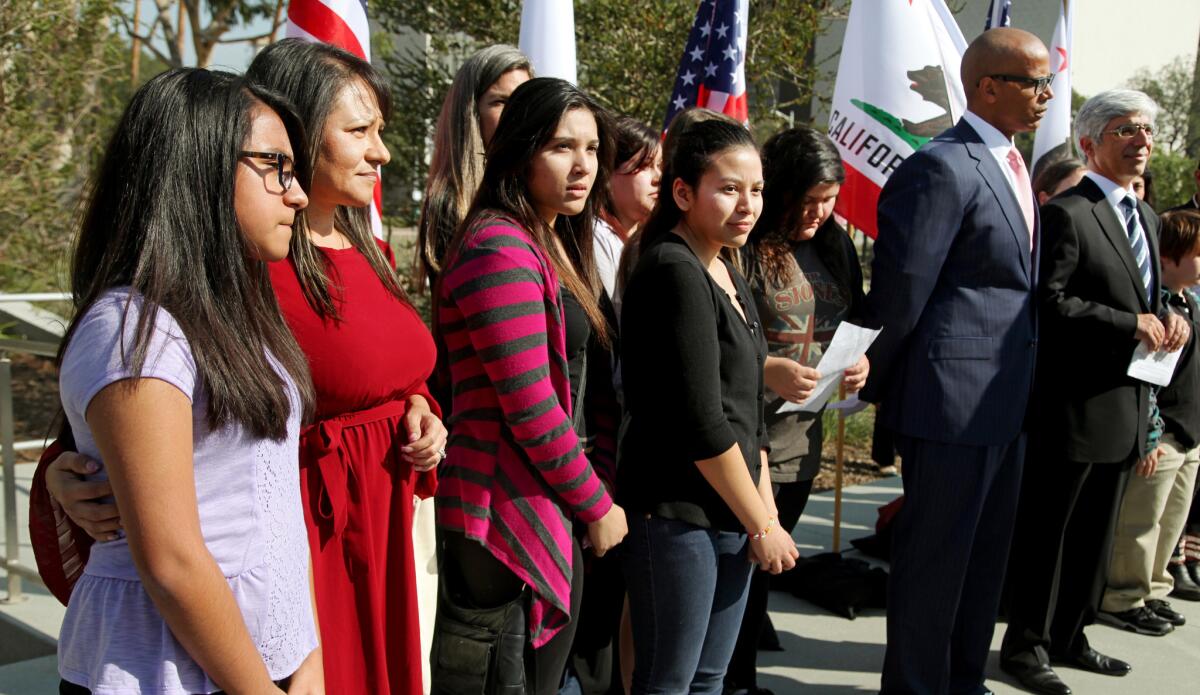Op-Ed: Kill tenure, cure schools?

Without a doubt, Californiaâs poor and minority schoolchildren get more than their share of ineffective, unmotivated and demoralized teachers.
But are the state laws governing teacher tenure, dismissal and layoffs now under attack in a Los Angeles court case the real cause of the inequities? And if so, do they violate both the equal protection guarantees and the right-to-education provisions of the California Constitution?
Those questions, explicit and implicit, run through the testimony and arguments in the case of Vergara vs. California in state Superior Court in Los Angeles. The case, brought on behalf of nine students in the Los Angeles, Pasadena and other California school districts, is now before Judge Rolf M. Treu. Even a clear victory for the nine may not be much of a fix.
Among the laws under attack are three that are often criticized. One in effect guarantees any new teacher lifetime tenure if he or she is rehired after just 16 months on the job; another makes it so cumbersome and costly to fire even the worst teachers that such dismissals are almost impossible; a third, known as LIFO (for âlast in, first outâ), requires districts cutting budgets to lay off teachers based not on their effectiveness but in reverse order of seniority.
These laws drive many school administrators crazy, and they are easily characterized as putting the interests of adults over those of students. In vehemently trying to protect the laws and their membersâ jobs, teachers unions may well have become their own worst enemies.
In fact, some believe that Vergaraâs civil rights argument is a loss leader in a larger public employee union-busting battle (see Wisconsin and Ohio), and/or part of an attempt to privatize public schools.
The case, and the public relations effort accompanying it, is being bankrolled by a nonprofit called Students Matter, set up by Silicon Valley entrepreneur David Welch. Welch is seconded by groups such as Ben Austinâs Parent Revolution and Michelle Rheeâs StudentsFirst, with funding help from Eli Broad and the Walton Family Foundation, all of which have battled teachers unions and supported charter schools and âtransformationalâ change in public education.
Among familiar California civil rights organizations, only Oaklandâs Education Trust-West, which focuses on diminishing the achievement gap between minority and white students in school, has joined the case. Its former director, Russlynn Ali, until recently assistant secretary for civil rights in the Obama administrationâs Department of Education, is on the advisory board of Students Matter.
But where are MALDEF, the ACLU and Public Advocates, all major forces in the fight for equal and adequate education in California? The answer, according to Ali and other backers of the suit, is that civil rights groups like Public Advocates have become too cozy with the unions.
Beyond the issue of unions and union busting, how does Vergara stack up? What are the chances that the plaintiffs could prevail, and if they did, what would a win accomplish? In the toxic mix of things that damage educational opportunities for Californiaâs poor and minority kids â inadequate funding, dilapidated facilities, lack of textbooks and other materials, the scandalous shortage of counselors, librarians, nurses and other support personnel, the lack of good preschools â fighting teacher tenure and layoff laws may well be, as John Affeldt of Public Advocates says, just a âdistraction.â
Manny Rivera, the spokesman for Students Matter, agrees: âThereâs no silver bullet.â But âthese laws are things we can do something about.â
They certainly make fat targets. But itâs less clear that a strong enough link, logically or legally, can be made between the challenged laws and possible violations of the Constitutionâs promise of a decent education for all children and its guarantee of equal protection.
If the plaintiffs win, the Legislature would have to replace the three statutes with something else: more reasonable dismissal laws; retention rules based, presumably, on effectiveness, not seniority; a longer probationary period for new teachers before they get tenure.
But given the political power of the unions, the plaintiffsâ own logic raises serious doubts that the Legislature could produce something significantly better. And if seniority is no longer a factor in determining whoâs let go during fiscal crises, whatâs to prevent districts from first laying off senior teachers, who are the highest on the pay scale, regardless of how good they are?
Laws that make it hard to dismiss or replace teachers were originally designed to protect them against the nepotism and the racial, social and cultural biases that were all too common in education until well after World War II. If those protections are curtailed, and if a new system relying heavily on âeffectivenessâ â itself an uncertain standard â is put in place, whatâs to say it wonât make teachers competitors and undermine morale and collaboration?
Itâs possible that if the courts find that the tenure laws in this case offend constitutional equal protection guarantees, many of the systemâs other inequities might be open to legal challenge as well. Ali, among others, has that hope, and she sees Vergara as a first step in that larger battle.
But if the Vergara plaintiffs win a resounding victory in this case, donât look for any quick change in the schools or some great improvement in outcomes for disadvantaged kids. There are just too many other uncertainties, too many inequities, too many other unmet needs.
Peter Schrag, the former editorial page editor of the Sacramento Bee, is the author of âParadise Lost: Californiaâs Experience, Americaâs Futureâ and âCalifornia: Americaâs High-Stakes Experiment.
More to Read
A cure for the common opinion
Get thought-provoking perspectives with our weekly newsletter.
You may occasionally receive promotional content from the Los Angeles Times.










